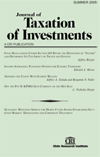Real Estate Investment Trust Income: Selected Issues and Recent Changes in the Law
Author: Michael J. Brody.; David O. Kahn.; Eric J. Matuszak.
Source: Volume 26, Number 02, Winter 2009 , pp.62-75(14)

< previous article |next article > |return to table of contents
Abstract:
Real estate investment trusts (REITs) are the creation of legislation enacted in 1960 that was intended to provide the average investor with a tax-favorable method of investing in a diversified portfolio of real property, in much the same way mutual funds provide average investors with a tax-favorable method of investing in a portfolio of securities. The rules in the 1960 legislation, as well as various amendments over the years, generally sought to ensure that REITs primarily act as passive investors in real estate assets and otherwise do not engage in the active conduct business activities. To qualify for taxation as a REIT, various tests imposed under the Internal Revenue Code must be met, including tests related to the REIT’s gross income, asset composition, distribution levels, and diversity of stock ownership. If an entity qualifies for taxation as a REIT, it generally is not required to pay federal corporate income taxes on its net income that is currently distributed to stockholders. This treatment substantially eliminates the “double taxation” that ordinarily results from investment in a C corporation. This article focuses on certain rules related to the gross income test requirements applicable to REITs, including certain recent developments resulting from the American Housing Rescue and Foreclosure Prevention Act of 2008 (the “2008 Housing Act”) signed into law on July 30, 2008.Keywords: REITS
Affiliations:
1: Latham & Watkins LLP; 2: Latham & Watkins LLP; 3: Latham & Watkins LLP.